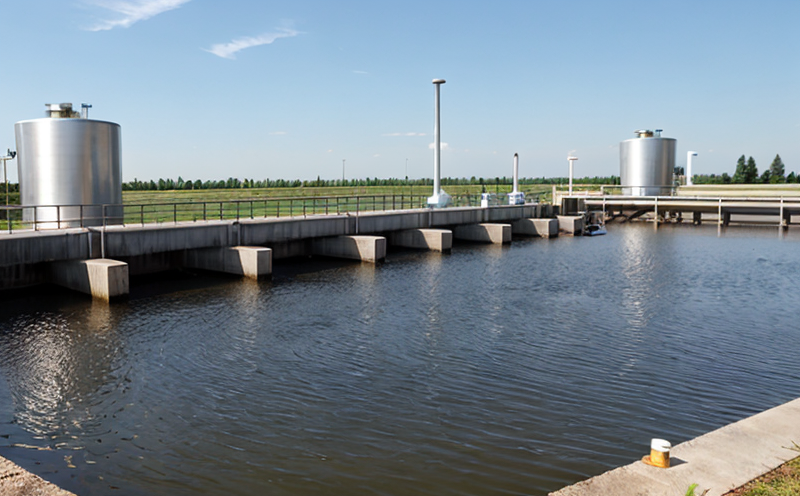ISO 5667 10 Wastewater Sampling Testing Validation Method Development Test
The ISO 5667-10 standard provides a validated methodology for the sampling and testing of wastewater. This service is crucial in ensuring compliance with environmental regulations, particularly those related to water quality standards set by international bodies such as the World Health Organization (WHO) and regulatory agencies like the U.S. Environmental Protection Agency (EPA).
The ISO 5667-10 method focuses on the development and validation of sampling procedures that ensure accurate and reliable measurement of microorganisms in wastewater streams. This service is vital for industries such as food processing, chemical manufacturing, pharmaceuticals, and municipal utilities, where wastewater discharge can impact public health and the environment.
The process begins with careful selection of sampling points within the wastewater system to ensure a representative sample. Samples are then collected using specialized containers designed to minimize contamination and preserve microbial viability. Once collected, samples are transported under controlled conditions to our laboratory for testing.
Our laboratory is equipped with state-of-the-art microbiological analysis equipment, including flow cytometers, automated colony counters, and real-time PCR machines. These tools allow us to perform precise quantification of microorganisms present in the wastewater sample. The method development component involves optimizing sampling techniques and analytical procedures to ensure they meet stringent quality control criteria.
The validation process adheres strictly to ISO 5667-10 standards, which include rigorous statistical analysis to establish confidence intervals around measured values. This ensures that any deviations from expected results are due to genuine variations in the wastewater rather than errors in sampling or analytical methods.
Our service also includes detailed reporting of findings, including raw data, calculated concentrations, and graphical representations such as histograms showing frequency distributions of detected microorganisms. Additionally, we provide recommendations for improvements to the sampling protocol based on our analysis, helping clients optimize their environmental compliance programs.
In conclusion, this service plays a critical role in maintaining sustainable practices by ensuring that wastewater treatment processes are effective at removing harmful pathogens while minimizing ecological impacts. By adhering to international standards like ISO 5667-10, we help clients achieve regulatory compliance and protect both human health and aquatic ecosystems.
- Environmental monitoring
- Compliance auditing
- Treatment process optimization
Applied Standards
The ISO 5667-10 standard is widely recognized for its comprehensive approach to wastewater sampling and testing. It specifies procedures for the collection, preservation, transport, and analysis of samples containing microorganisms. Compliance with this standard ensures that results are consistent across different laboratories and over time.
Our laboratory has been certified by ISO/IEC 17025:2017 to perform microbiological testing according to ISO 5667-10 guidelines. This certification demonstrates our commitment to delivering accurate, reliable data that meet the highest scientific standards.
Environmental and Sustainability Contributions
The work we do under ISO 5667-10 directly contributes to environmental sustainability by providing essential data for managing wastewater more effectively. By identifying the presence and concentration of microorganisms in wastewater, our clients can implement targeted treatment strategies that reduce the spread of pathogens into natural water bodies.
- Reduction of pathogen load in released effluents
- Enhanced efficiency of waste reduction efforts
- Promotion of cleaner production processes
Our services also support broader sustainability goals by helping organizations comply with environmental regulations, which can lead to reduced fines and improved reputations. Additionally, accurate wastewater sampling data enables better resource management, leading to lower operational costs and more sustainable business practices.
Use Cases and Application Examples
This service is particularly relevant for industries that discharge significant amounts of wastewater into public sewers or bodies of water. For instance, food processing plants often rely on this testing to ensure their effluent meets stringent hygiene standards set by local authorities.
- Municipal wastewater treatment facilities use our services to monitor the effectiveness of their treatment processes and adjust them as needed.
- Pharmaceutical companies benefit from our expertise in assessing microbial content in their industrial waste streams before release into municipal systems.
We also assist R&D teams in developing new treatments for wastewater that can target specific pathogenic strains, thereby enhancing overall water quality. Furthermore, this service aids in evaluating the performance of advanced purification technologies designed to remove harmful microorganisms from treated effluents.





